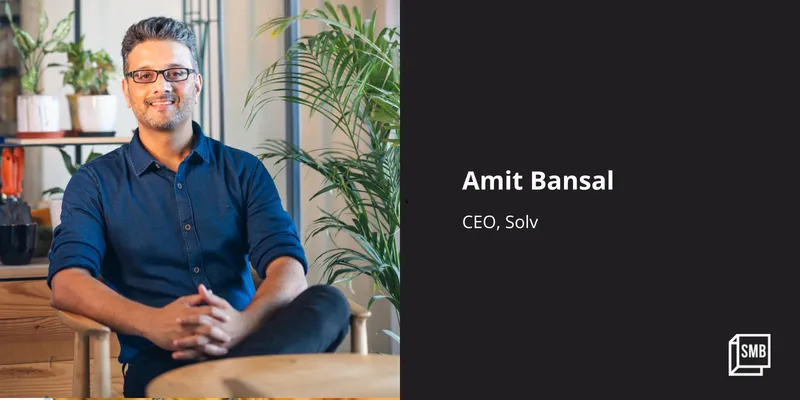Solv is addressing MSMEs' pain points by enabling market access and fair price
Solv is a B2B ecommerce platform focused on MSMEs and has achieved $600 million of GMV while being profitable at the unit economics level.
Despite being a key pillar of the Indian economy, the micro, small and medium enterprises (MSME) sector still finds it challenging to get the right market opportunity, unlike larger companies.
Bengaluru-headquartered business-to-business (B2B) ecommerce marketplace startup Solv has been on a mission over the last five years to solve two key challenges of MSMEs—market access and price.
Founded in 2019, has combined the elements of technology and human interaction to create an online platform of trust to ensure there is business collaboration among genuine members of the MSME community.
“We want to improve the livelihood of MSMEs in the country,” Amit Bansal, CEO of Solv, tells SMBStory.
India has more than 63 million MSMEs that together contribute 30% of the country’s GDP and 40% of exports. The sector provides 110 million jobs, according to the MSME Ministry’s FY23 report.

Govt steps help boost toy exports, manufacturing; more work needed: DPIIT Secy
Despite these numbers and an increase in digital adoption in the country, MSMEs still find challenges in growing their business.
For example, in the developed economies, manufacturers and retailers, regardless of their size, have a direct link. However, India has middlemen who add to the complexity of doing business.
Further, the MSME manufacturers do not have a wider market access given their size, thereby limiting their reach with any potential buyers. On the other hand, the small and medium retailers who buy these products do not get access to a wide selection or better pricing. They are dependent on the distributors and wholesalers.
The retail industry in India is estimated to be around $900 billion. Around 85% of the industry comes under the unorganised segment dominated by small retailers, while the rest comes from modern retail.
Model
Bansal says Solv adopted an inventory-less business model, where it has become a facilitator between the MSME producers and retail buyers. The inventory-less model is a key part of Solv’s strategy for building trust among the MSMEs.
It is generally observed that any business that adopts an inventory-led model can control the price and distribution of products.
Under Solv’s model, MSME producers or sellers can be part of the platform on an invite-only basis, whereby they are carefully curated based on various parameters. “It is important to maintain the seriousness of sellers and buyers and they pass through very tight selection criteria,” says Bansal.
The buyers or retailers need to be businesses that are selling to an end consumer and not a wholesaler or distributor.
Solv is present across six categories—grocery, apparel, home furnishing, footwear, and small electronics. It has a presence in over 500 cities in the country with over 400,000 retailers and MSME producers.
Bansal says, “For the small retailer we are solving for price and selection and for the manufacturers it is about mass-scale distribution.”
Business metrics
On the business metrics, Bansal says Solv is recording a gross merchandise value (GMV) of $600 million and says it has seen a 10X rise in revenue over the last 24 months.
“We are already unit economics profitable and aim to achieve EBITDA level profitability by the end of 2026,” says Bansal.
SOLV’s CEO says that the majority of the retailers on its platform have a turnover of less than Rs 2 crore per annum. He further added that it gets over 60% repeat business.
On the MSME manufacturers, Bansal says the company prefers those who have a keen understanding of customer requirements and how well they can service them.
At the same time, Solv is also enabling credit facilities to the members through its platform through partnerships with non-banking finance companies (NBFCs) and banks. It has sanctioned around Rs 400 crore of credit.
Solv has raised around $130 million in funding so far, with the last round of funding of $40 million in June 2022. Among the key investors in Solv are the likes of SBI Holdings Japan and SC Ventures.
On being asked what makes Solv different from other players in the market, Bansal says, “We want to make an impact in the lives of MSMEs and do not want to compete with the sellers. Our number one value is to be frugal.”
(The story was updated to add GMV figures and investors name)
Edited by Affirunisa Kankudti



1565616772022.png?mode=crop&crop=faces&ar=16%3A9&format=auto&w=1920&q=75)



